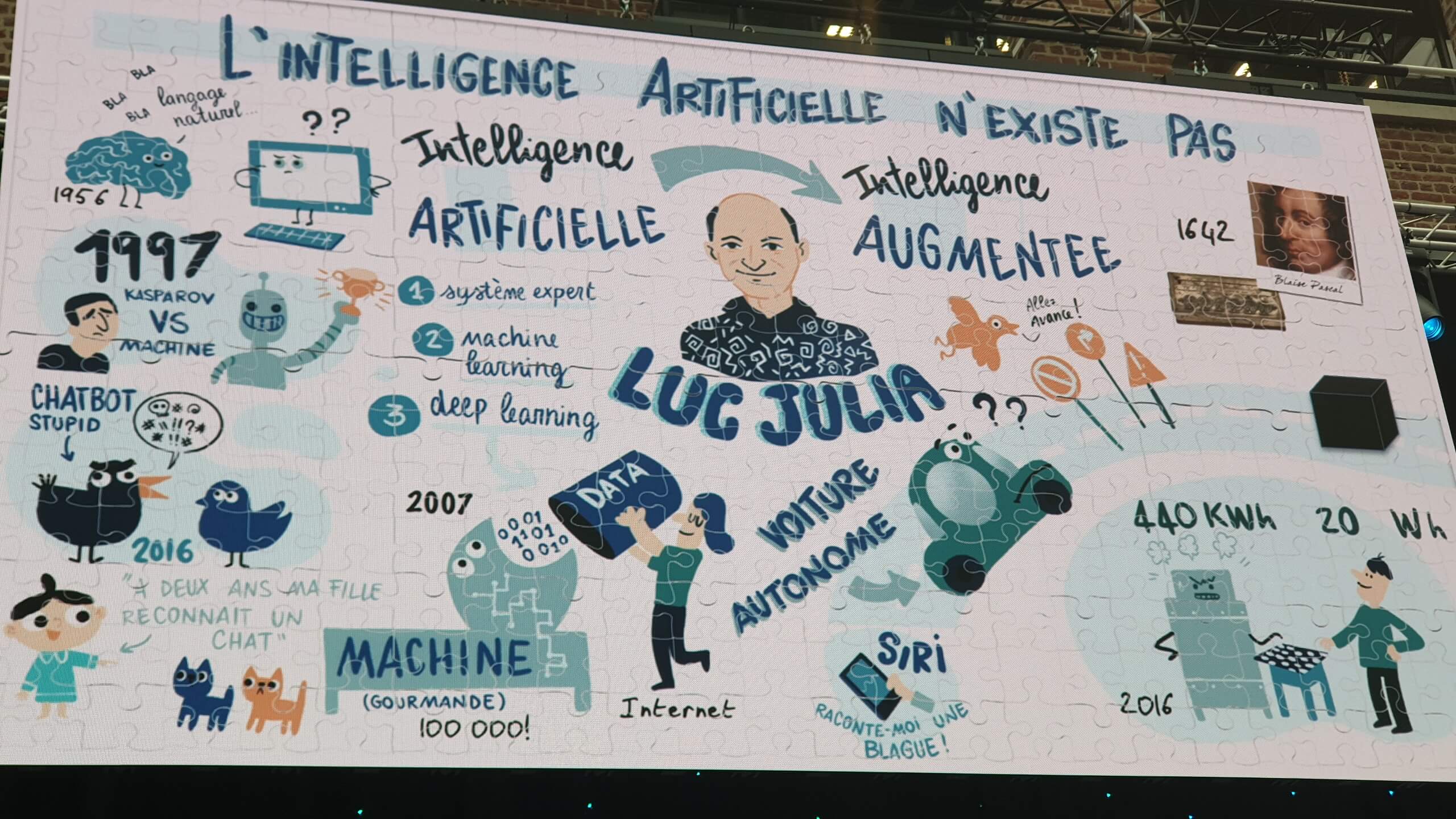Reading time
10 minutes
Home >> Blog >> Tech, politics & power >> A short stupid story…

Does artificial intelligence exist?
Luc Julia, VP of innovation at Samsung, says well, it depends.
September 2019, Lille. During just another crowded tech-event, he points out how, for
instance, AI – in the form of completely autonomous self-driving cars (level 5) – cannot
entirely cope with all the sophisticated forms of human intelligence in a traffic jam.
And with its even more sophisticated forms of stupidity, either.
Does intelligence exist?
And is intelligence or rather stupidity what really drives the development of technology?
1. War of logics (1600-1950)
The roots of the digital revolution are to be found in Modern Age, in philosophy, more
precisely when Leibniz starts wondering: can calculation solve a dispute? [Russell, B., Storia della filosofia occidentale (1948), Milano, Longanesi, 1974, Vol. III, p. 774]
Logic evolves via binary code, tubes, paradoxes: brilliant minds turn abstract thinking
into computers: “The trouble with the world is that the stupid are cocksure and the
intelligent are full of doubt,” Bertrand Russell says.
And what’s more stupid than making war?
World War II sees the rise of encryption and decryption technologies and launches the
race to more sophisticated ICT.
Alain Turing, the logician who had cracked Nazi’s code, makes a test for computers.
Question: “Are you intelligent?”
The first AI test ever inspires “Blade runner” but does not spare Turing’s life, in spite of
his contribution to the end of the war. Because he is intelligent, but also homosexual.
And stupid people tend to dislike both.
Even the stupid knows that intelligence is powerful, though, and the dream of an
artificial one sounds very promising.

2. Money coding (1950-1975)
After the war, the free world opts for peace and eternal growth.
PR specialist Edward Bernays says that people are not like Trotszki, they do not want
permanent revolution, they want to buy stuff, which they do not need, in particular if
they cannot afford it.
He knows for sure, Sigmund Freud is his uncle.
The communication warfare, i.e. the arts formerly known as “propaganda”, recruits new
soldiers, the Mad Men, who master the secret of advertising : “happiness.”
This new era of consumerism, which a BBC documentary calls “The century of the
Self,” comes in the form of an algorithm with a contradiction.
Computers follows a mathematical logic: only numbers accepted.
Consumerism follows the logic of profit, which is based on emotions: for dreams only.
How to combine numbers and dreams, how to combine intelligence and stupidity?
3. Computer for the masses (1975-2000)
In his 1976 “Open letter to hobbyists,” Bill Gates, not yet a billionaire nor a
philanthropist, accuses early IT developers, geeks, and freaks, who dislike passwords, to
“steal” and to “prevent good software from being written”.
Free or proprietary software, the IT community splits in two.
On one side, the Free Software movement, a libertarian community of developers,
inspired by Richard Stallman, opposes the logic of profit and paves the way to Linux:
computers for the people.
On the other side, the commercial exploitation of Windows takes computers to the
masses.
At that time, Artificial Intelligence is more popular in the cyber-punk literature than in
the business community, which is not that interested in beating humans at chess.
In the background, though, numbers and dreams keep competing, this time to exploit
the technologies of a post-war military network of communications (ARPANET).
The Cold War and the commercial exploitation creates the mass market for further
research and exploitation.
Ronald Reagan, new US president and former actor in Hollywood, accelerate economic
deregulation and dematerialisation, and consequently the rise of personal computers and
finance.
When the Cold War comes to an end, the contradiction between numbers and dreams
seems to melt down: we can all be free and rich at the same time.
The dot-com bubble in the late 1990s says it was wishful thinking.
HAVE YOU EVER HEARD OF MOBILE VIDEO MARKETING?
In a world, where everything is communication, you have to master your own means of digital production.
4. The debt algorithm (2000-2010)
Modern finance makes bubbles [See also “Free exchange” in The Economist, September 28th 2019, p. 72].
Bubbles are like Neo in the “Matrix,” the blockbuster with Keanu Reeves: the chosen
one must destroy the system, so that the system can reboot.
In this metaphor, Steve Jobs is Morpheus and you can pick the red or the blue cover for
your iphone.
Ten years after the dot-com bubble, the subprime crisis generates the “worst economic
crisis since 1929” and explains the state of exception behind consumerism.
It’s actually a permanent revolution, like in the Soviet Union, but this one is based on
debt for future generations.
Banks and institutions, under the scrutiny of rating agencies, accumulate mortgages
from American citizens, regardless their ability to repay.
Then, coding turns this debt into financial products, which generate high returns and
higher risk.
They have no choice.
Eternal growth is a matter of dreams rather than numbers.
Dreams can change the world, though, and the world can change dreams.
At the time of the dot-com bubble, Microsoft still calls the open source movement a
“cancer” and make plans for sabotage, such as the “Millennium documents.”
Its concerns are excessive, though: the Open Source Movement does not share the same
ideological drive of the Free Software Movement.
“Open source” is just a IT development methodology to produce better software,
precisely what Bill’s open letter demands.
“I don’t think that Microsoft is evil in itself; I just think that they make really crappy
operating systems,” Linux’ creator says, before adding that Linux is ok with business.
Everything has to change, if everything has to remain the same.
After the dot-com bubble bursts, the Open Source Movement is well placed to redeem
the evil commercial exploitation of the early digital era from its naivety.
After the subprime crisis, investors reset the calculation and see an opportunity in going
open source.

5. The startup army (2010-2020)
In 2008, Google releases its first commercial Android device, as open source software.
In 2010, the newly appointed CEO declares: “Microsoft loves Linux.”
Intelligent people have feelings, after all.
Stupid people have feelings, too, which is why they get easily impressed by new toys,
such as Tinder or Pokemon Go.
Besides, in spite of what the Free Software preaches, they do not really grasp the
difference between free as “free speech” and free as “free beer”.
Who really wants to resist the promise of eternal growth, after all?
The contradiction between coding and eternal growth persists, but the new externalities,
such as programmed obsolescence, social engineering or cyber surveillance, are still
hidden at the eyes of the digital citizens.
It is not only the appropriation of an open source methodology that changes the game.
The more powerful hardware become, the more software can exploit new killer features,
such as data mining and, in a near future, quantum computing.
The means of production become mobile, and freely available in everyone’s pocket.
Economists have feelings, too: they love Karl Marx.
And they prove their love by embracing his linear vision of history: the digital revolution
will replace the industrial era, like the industrial era replaced agriculture.
Futurism becomes the dominant narrative.
If an ugly teenage geek makes an app in his garage and the day after becomes multibillionaire,
why can’t you?
The promotion of entrepreneurship, in a world of dominating corporations, replaces any
residual class feeling with the survival of the fittest.
A new obedient “Startup” army populates a newly impoverished “shared” economy,
which thrives in a sea of economic externalities, intellectual property, user-generated
labour, cyber-insecurity, social media warfare.
The army fights for apps, seeding, funding, scaling, game-changers, success stories.
Be fool, be stupid, be angry: disrupt everything so that everything stays disrupted.
After playing Gutenberg for a while, the fittest evolve into stock options.
They share their body with the markets, like Jesus shares his body during his last dinner.
Global funds, venture capitalists, investors fill this body with money.
The more this collective intelligence move money, the more the new tech-gurus and
philanthropists increase their private control over society.
Whether they handle cryptocurrencies, fancy companies of co-working (WeWork) or presidential races on Twitter, the algorithm says: if you want to sell the debt, just show
the profit.
Jesus asks for faith, they simply ask for data.
Which they use to analyse, to target, to predict, to include and to exclude.
This is why data are the “new oil”, this is why data need protection.
Data are necessary to feed AI, so that artificial intelligence can finally solve the
contradiction between numbers and dreams.
More perfect machines for the Turing Test: wow, you’re so intelligent!
Are you a machine? Yes.
Are you happy?
6. Artificial stupidity (2021)
Does intelligence exist?
Are numbers or rather dreams what really drives intelligence?
From a narrow perspective, the last 70 years of ICT innovation are extraordinary.
From a long-durée historical perspective, this is just a short stupid story of intelligence.
The scientific, military, and economic base drives ICT development: it reflects the
power of numbers over society.
Consumerism is the ideological superstructure that supports the logic of profit: it
reflects the power of ideas over life.
This ideology reflects ideas into actions, companies into stock options.
It turns debt into profit, violence into success, belief into share price.
It transforms the planet into a commodity, which people are urged to save buying more technology.
It makes the stupid look intelligent and the intelligent look stupid.
Don’t stay fool, or they will make you hungry.
HAVE YOU EVER BOOKED A VIDEO ONLINE?
We have created the first and most powerful automation system for online video booking.
7. Happy ending (2022)
The good thing about the futurist narrative is that it does not oppose change: it rather
depicts it as necessary.
Today, our personal idea of change consists of a serious commitment to media literacy,
to exploit the huge amount of intelligence that the Web hosts from its origins.
The social distribution of knowledge has a direct influence on inequalities and,
consequently, on the quality of democracy.
What if we started using the smartphone less, what if we started using it better?
